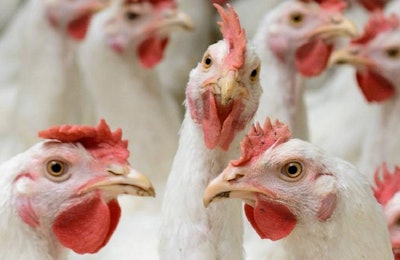
Tennessee State Veterinarian Samantha Beaty on January 20 reported a new detection of highly pathogenic avian influenza (HPAI) in a commercial broiler chicken flock at a farm in Weakley County.
Following a sudden spike in bird deaths, lab tests confirmed the presence of H5N1 HPAI.
Since September of 2022, HPAI cases in Tennessee have sickened domesticated chickens, geese, ducks, and turkeys in Bledsoe, Davidson, Obion, Tipton, and Weakley Counties. However, prior to this, there have been only three other HPAI-affected Tennessee flocks during this outbreak.
According to the United States Department of Agriculture (USDA) Animal and Plant Health Inspection Service (APHIS), all three of the state’s previous cases were in commercial broiler breeder flocks. One of those was in Bledsoe County and involved 20,900 chickens, while the other two were in Weakley County, involving 43,600 and 19,000 chickens. The Bledsoe County case was confirmed on November 15, 2022, while both previous Weakley County cases were confirmed on December 28, 2022.
The size of the flock involved in the most recent case has not yet been disclosed.
“Unfortunately, HPAI continues to spread to farms of all sizes,” Beaty said in a press release. “There have been four previous detections in Weakley County affecting backyard flocks. It’s apparent this disease remains a threat to the poultry industry. We want bird owners to know that their consistent practice of thorough biosecurity measures is the best way to protect the health of their flocks. Introduction of this disease can be from wild birds gathering on your property or you can carry it into your flock if you are not wearing clean shoes and clothing.”

Dr. Samantha Beaty | Tennessee Department of Agriculture
Animal health officials have established a 10 kilometer (6.2 mile) control zone surrounding the affected facility. Within the zone, poultry will be tested and monitored for illness and poultry movement requires permitting until the zone is released. Animal Health staff are contacting poultry owners within the control zone to answer questions and provide information. If you have concerns about your location, email [email protected] or call +1.615.837.5120 and the staff will help determine if your flock is within the zone.
HPAI has also been found in wild birds, including ducks, geese, vultures, and eagles in Tennessee.
To learn more about HPAI cases in commercial poultry flocks in the United States and Canada, see an interactive map on WATTPoultry.com.
Read our ongoing coverage of the global avian influenza outbreak.


















